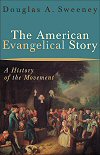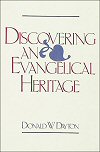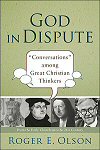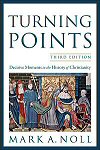Baker Academic Church History Collection (4 vols.)
Digital Logos Edition
Overview
This collection includes four volumes on church history. It allows readers to discover the people and events that have impacted and shaped Christianity. Two volumes focus on the broader scope of church history—key events and figures. Turning Points concentrates on 14 critical moments in church history. God in Dispute presents 29 imaginary dialogues and debates between church history’s leading figures, assessing each theologian and the key issues they presented. The collection’s other two volumes focus on American Evangelicalism. They analyze its rise, social reforming roots, key figures, subgroups, current challenges, and future.
With the Logos edition of the Baker Academic Church History Collection, you can instantly access important information about dozens of prominent individuals and historical Christian events that have influenced—and continue to influence—the church. The advanced search tools in Logos Bible Software give you instant access to the subjects, topics, and individuals you’re looking for. All Scripture references are also linked directly to the Bibles in your library, making God’s Word instantly accessible.

Key Features
- Analyzes evangelicalism's history
- Provides 29 imaginary dialogues and debates between key theologians
- Studies important events that impacted church history
Product Details
- Title: Baker Academic Church History Collection
- Publisher: Baker Academic
- Volumes: 4
- Pages: 1,080
- Resource Type: Histories
- Topic: Historical Theology
Individual Titles
- The American Evangelical Story: A History of the Movement by Douglas A. Sweeney
- Discovering an Evangelical Heritage by Donald W. Dayton
- God in Dispute: “Conversations” among Great Christian Thinkers by Roger E. Olson
- Turning Points: Decisive Moments in the History of Christianity, 3rd ed. by Mark A. Noll
This title is included in the following collections
You can save when you purchase this product as part of a collection.
Baker Academic Church History ...
$118.95$100.99Baker Academic Church History ...
$143.94$122.99Baker Ultimate Collection 2022...
$38,273.89$30,599.99

The American Evangelical Story: A History of the Movement
- Author: Douglas A. Sweeney
- Publisher: Baker Academic
- Publication Date: 2005
- Pages: 208
The American Evangelical Story surveys the role American evangelicalism has had in the shaping of global evangelical history.
Author Douglas Sweeney begins with a brief outline of the key features that define evangelicals and then explores the roots of the movement in English Pietism and the Great Awakening of the eighteenth century. He goes on to consider the importance of missions in the development of evangelicalism and the continuing emphasis placed on evangelism. Sweeney next examines the different subgroups of American evangelicals and the current challenges faced by the movement, concluding with reflections on the future of evangelicalism.
Combining a narrative style with historical detail and insight, this accessible, illustrated book will appeal to readers interested in the history of the movement, as well as students of church history.
Evangelical history can seem complicated, but in this book, clarity, precision, and solid spiritual lessons are the order of the day. For care in defining who evangelicals are and have been, for reliability from using the best available scholarship, for awareness of world trends and political influence, and most of all for concentration on the Christian meaning of evangelical history, this is a very fine book.
—Mark A. Noll, Francis A. McAnaney Professor of History, University of Notre Dame
This is a great resource, especially for people who want something short and easy to read yet detailed enough to apprise them of what evangelicalism is about. Unlike some books that read like dry compilations of unending historical facts, this one is engaging from start to finish. It is also inspiring. Perhaps the best thing about it is Sweeney’s attitude—he is appreciative of the movement’s famed leaders yet diligent to acknowledge that others, such as Pentecostals, charismatics, women, and blacks, have also made significant contributions that should be joyfully recognized as basic to a true telling of the story.
—Sarah Sumner, dean, A.W. Tozer Theological Seminary
Here is a superb overview of American evangelicalism presented with vigor, insight, and sympathy. This is a fine introduction written by one of our best historians.
—Timothy George, dean, Beeson Divinity School
The American Evangelical Story is a fascinating and readable introduction to the history and theology of the evangelical movement. Douglas Sweeney tells the story of American evangelicalism with the passion and clarity of an insider and the insightful eye of a trained and seasoned historian. With recognition of evangelicalism’s imperfections and failures, Sweeney recounts a movement that attempts to be faithful to the Gospel, is broad and inclusive in its reach, and at its best motivates participants to act to change humanity both at home and abroad.
—David G. Roebuck, director, Hal Bernard Dixon Jr. Pentecostal Research Center
Sweeney’s bracing history of American evangelicalism brings the lesser-known branches of the movement into the fold, placing them in the broad context of the history of the church. This welcome addition to the field pulses with the author’s faith and optimism for the future growth of evangelicalism in a hurting world so long as it adheres to the historic mission of our faith. Even as he casts an attentive, critical eye on the mistakes of the past, Sweeney swings the gate wide open in a welcome embrace of the incredible diversity and richness of the American church. The strength of this book is that the author’s lucid and engaging analysis focuses not merely on ideas but on the consequences of faith in action. I strongly recommend this book as an introductory text to all students of Christian history, especially college freshmen at Christian colleges and universities.
—Judith Mendelsohn Rood, professor of history and Middle Eastern studies, Biola University
For those who have been looking for a brief, balanced, and reliable introduction to American evangelicalism, The American Evangelical Story is an excellent place to start. Scholars and general readers alike will benefit from Sweeney’s delightful wit, insightful reflections, interpretive balance, mastery of the sources, and clear prose.
—Garth M. Rosell, professor of church history, Gordon-Conwell Theological Seminary
Douglas A. Sweeney is professor and chair of the Church History and the History of Christian Thought Department and director of the Jonathan Edwards Center at Trinity Evangelical Divinity School.

Discovering an Evangelical Heritage
- Author: Donald W. Dayton
- Publisher: Baker Academic
- Publication Date: 1988
- Pages: 200
When it first appeared, Discovering an Evangelical Heritage was widely regarded as a groundbreaking historical work. The continued relevance of the issues with which this book deals justifies its reappearance 12 years after its first advent challenged countless people to rethink their evangelical heritage. If anything, the challenge is even greater now to follow the example set by the forebears of twentieth century evangelicalism.
For instance, Catherine Booth, cofounder of the Salvation Army and ardent feminist, offers a powerful testimony to the impact that Christian witness can and should have upon society. Likewise, abolitionist Theodore Weld, converted under the ministry of Charles G. Finney, showed what a response to the radical call of Christ means as he strove to right social injustice and inequity during his day.
Despite the hardship and consequences of living out their faith, these and other evangelical forerunners left a heritage to be remembered and an example to be followed. Like the author himself, the reader will be challenged to rethink his or her own relationship with evangelicalism and will have to reflect upon the broader significance of that movement in American culture.
Donald W. Dayton was a professor of theology and ethics at Northern Baptist Theological Seminary in Lombard, Illinois. He received his PhD from the University of Chicago.

God in Dispute: “Conversations” among Great Christian Thinkers
- Author: Roger E. Olson
- Publisher: Baker Academic
- Publication Date: 2009
- Pages: 304
This volume creatively explores the history of Christian thought by imagining a series of 29 dialogues and debates among key figures throughout church history. It traces the history of theology via such conversation partners as Augustine and Pelagius, Calvin and Arminius, Barth and Brunner, and Bultmann and Pannenberg. Each imagined dialogue includes a brief summary that introduces the figures under consideration and places them in the history of theology, a more detailed assessment of the thinkers and theological issues presented, and a guide for further reading. This approach offers readers an entertaining, informative, and concise history of Christian thought. The book will be of use to professors and students in theology, church history, and historical theology courses and will also interest pastors and lay readers.
Most textbooks that trace the development of historical theology provide us with content, unpacking the positions of theologians and major schools of thought. While Olson’s book does that, it also does much more. By bringing generations of Christian thinkers together in dialogue to discuss a number of topics, Olson helps us understand that the Christian tradition is a complex, lively, ongoing argument about what happened in Jesus Christ. And while most textbooks leave the reader an arm’s length from the disputes, Olson’s approach invites us into the fray as participants in the debates. This is a unique text that makes historical theology come alive.
—Dennis Okholm, professor of theology, Azusa Pacific University
God in Dispute creatively presents significant issues in Christian doctrine through imaginary dialogues between giants in the history of our faith. Professors, students, and laypeople alike will find it a valuable resource.
—Vincent Bacote, associate professor of theology, Wheaton College
Few scholars possess the creativity, historical breadth, and theological acumen to pull off a volume like this. If Roger Olson’s fictionalized discussions occasionally reveal as much about his own views as those of other Christian thinkers, then the excellence of his unusual survey of church history can be his excuse.
—Christianity Today
Historical theology doesn’t have to be dry, dusty, and dull. With Roger Olson as a guide, it can be downright entertaining. . . . God in Dispute collects 29 . . . insightful dialogues involving great Christian thinkers from the early church to the present. . . . He presents the key ideas of each speaker through lively—and sometimes humorous—dialogue. . . . For readers who want to dig deeper, each dialogue ends with a list of suggested books for further reading. But for those who are content with a sampling, Olson provides a painless introduction to some of the greatest Christian thinkers in history.
—Baptist Standard
[Olson] offers an intriguing approach to learning about the history of Christian theology. Using 29 imaginary conversations between two or more luminaries of Christian thought, he writes an easily understandable introduction not only to the conversational partners but also to the particular theological issues of every Christian epoch. . . . Even though the author takes pains to acknowledge that these conversations are imaginary, they do have an appropriate historical feel. Olson also makes a very helpful contribution in the setting he offers for each conversation; one understands exactly the context for the content. . . . For readers unfamiliar with this material, the book is an easy-to-read resource, and a list of further readings appears at the end of each selection. . . . Recommended. Lower- and upper-level undergraduates; general readers.
—Choice
On a number of levels, Olson succeeds in bringing these figures to life, so to speak, for a wide range of readers not limited to students of theology. . . . The structure of the book is quite refreshing. . . . God in Dispute is an enjoyable book that covers a lot of material. Olson casts as wide a net as is reasonable not only on the issues themselves, which extend as far as evangelical theology, liberation theology, and postmodern theology, but also [on] the conversation participants. . . . Olson’s humor will keep even the most cynical student engaged.
—Southwestern Journal of Theology
Roger E. Olson is a professor of theology at George W. Truett Theological Seminary, Baylor University, in Waco, Texas. He is a prolific author whose volumes include Reformed and Always Reforming, The Story of Christian Theology, and The Mosaic of Christian Belief. He is also coauthor of 20th-Century Theology.

Turning Points: Decisive Moments in the History of Christianity
- Author: Mark A. Noll
- Edition: 3rd
- Publisher: Baker Academic
- Publication Date: 2012
- Pages: 368
In this new edition of a popular introduction to church history, Mark Noll isolates key events that provide a framework for understanding the history of Christianity. The book presents Christianity as a worldwide phenomenon rather than just a Western experience.
Now organized around 14 key moments in church history, this well-received text provides contemporary Christians with a fuller understanding of God as he has revealed his purpose through the centuries. This edition includes a new preface, updates throughout the book, revised “further readings” for each chapter, and two new chapters, including one spotlighting Vatican II and Lausanne as turning points of the recent past.
Students in academic settings and church adult education contexts will benefit from this one-semester survey of Christian history.
If Mark Noll’s Turning Points gets the attention it deserves, it will contribute immeasurably to a turning point in the struggle for Christian unity within a principled diversity. As an introduction to the history of Christianity, it is fresh and illuminating. As a criticism of the churches, it is historically sound and scrupulously fair. As a statement of core beliefs, responsibilities, and tasks, it is penetrating and constructive. This book speaks eloquently to Catholics and Eastern Orthodox as readily as it does to Protestants.
—Eugene D. Genovese, American historian
This book majors in what is major, giving the reader a fine sense of what has happened, and it does so with care, precision, and respect for the past which is Noll’s trademark.
—David F. Wells, distinguished senior research professor, Gordon-Conwell Theological Seminary
This highly recommended work provides a thoughtful yet comprehensive framework for the history of Christianity.
—Library Journal
Noll’s treatment of the material is evenhanded, engaging, and illuminating. This will be a useful text for readers seeking a historical framework within which to understand their Christian faith.
—Publishers Weekly
An informative and inspiring survey of the history of Christianity designed for the general reader. . . . A thoughtful introduction to the two millennia of Christian history.
—Church History
Noll’s emphasis on historical significance allows him to range well beyond the institutional and doctrinal matters that dominate traditional church history surveys. . . . A valuable text for church study groups and college-level, one-semester surveys of church history.
—Journal of Church and State
The depth to which Noll’s research takes the reader is unmatched. . . . Even the casual reader—or the one who needs a refresher course—quickly enters into the purposes behind the turning points. . . . Reading this book may bring a turning point in your love for church history.
—Evangelical Journal
This book is a popular, but never unscholarly, study of important transitions in the history of the Christian Church. Turning Points is the product of a seasoned Christian historian that may be read with profit and delight by any intelligent Christian or by a critical historian. . . . Noll’s book is a splendid example of fine scholarship embedded in deep Christian piety. It will profit those seeking continuing education in churches and those who sit in academic classrooms.
—Perspectives
Mark A. Noll is the Francis A. McAnaney Professor of History at the University of Notre Dame in South Bend, Indiana. He is one of the nation’s most distinguished practitioners of American religious history and is the author of dozens of books in this field, including America’s God: From Jonathan Edwards to Abraham Lincoln and The Scandal of the Evangelical Mind.
Reviews
3 ratings
Anthony Sims
7/22/2015
Paul Pavao
9/5/2014
It was hard to choose a rating since this is a review of four books at once. I had my favorites among them, that's for sure. I really liked the idea of _God in Dispute_, but I did not like the results much. Some of the later characters in the book are outside my area of expertise. The Christians from the second and third century, however, I have read repeatedly. Tertullian and Irenaeus are two of my favorite writers. I understand the thought behind setting them against each other, but I do not at all like the picture it leaves a with a read who is unfamiliar with the early church. Both Tertullian and Irenaeus argued against gnostic heresies using the agreement and unity of the apostles' churches as a central point in their argument. _God in Dispute_ gives a picture of their unity that would never have been sufficient in their day. The churches of the late second century did not have a mere tolerance and general agreement with one another. They kept track of each other, interacted with each other, and had an exalted picture of the one holy and apostolic church based on preserving the teaching of the apostles. (Yes, they also called it catholic, but that was a reference to the unity of the apostolic churches, not to Rome.) Nothing in the disputes lets the reader know that Tertullian has some writings that were catholic--within the unity of the apostolic churches--before he was won over to Montanism, probably by his frustration with the permissiveness of the churches in regard to Christians who didn't live up to his standards. The others, however, I really enjoyed, and they were very helpful. The definition of "evangelical" (and even whether it ought to be capitalized!) is a matter, perhaps not of dispute, but certainly of disagreement. BakerAcademic has a series of books on pre-Nicene Christianity for evangelicals, and one of their books devotes at least 15 pages to choosing a definition. Zondervan's publishing rules call for evangelical to be capitalized only when referring to a specific denomination with "Evangelical" in the title, but that rule is hardly followed across the board. Thus, I was surprised to find that _Discovering an Evangelical Heritage_ places the start of the evangelical movement at the end of the great awakening in the early 19th century. I didn't know that, or the reasons for it, but the ramifications of that perspective on the evangelical movement were far more important than I could have guessed. I was fortunate to have chosen to read _The American Evangelical Story_ before getting to _Discovering an Evangelical Heritage_. This greatly helped in understanding the influence of various movements on evangelicalism, especially the varying strains of Calvinism. While I once would have lumped Jonathan Edwards in with Whitefield, Spurgeon, and most Presbyterians, I was introduced to nuances I had never heard of nor considered. While I can't say I memorized all those nuances in my first introduction to them, I did catch that Edwards had a softened version of Calvinism that made room for the world in general to be "called." This helped explain how he, and other Calvinists, could be so involved in a great awakening. It also provided some understanding for how the doctrine of double predestination espoused by Calvin affected Reformed believers in the 16th and 17th centuries, while explaining the explosion of evangelistic fervor in the 18th and 19th centuries. In fact, I found _the American Evangelical Story_ a whirlwind. It is impossible, if I want to understand the evangelical movement, for me to leave this at one reading. I'd really like to race through it a couple more times, setting aside time to read it through in a couple days, which is possible. I think with two more readings, a lot more could settle in. I suppose it could be read more slowly, but the book seems to pull the reader--or at least this reader--through the story at a rapid pace. Slowing down seems ... wrong; at least while reading this rapid-fire look at 500 years of Christian history. The last book, _Turning Points_, thrilled me a bit. I completely agree that history is best learned with "turning points" that break history up into periods. The author, Mark Noll, does a superb job of explaining why he is focusing on turning points. I can't say enough about how important I think this is. Evangelicals in general, in my experience, are woefully ignorant of church history and would have trouble placing even such notable men as Augustine, Thomas Aquinas, and Martin Luther in their appropriate age, much less century. If an evangelical can get his hands on _Turning Points_, he will suddenly have a list of eras he understands and can place. The turning points fit into a story, and stories are much easier to remember than lists of facts. In the end, I decide on four stars because I didn't like _God in Dispute_ too much. I wrestled with giving the series five stars because I believe the benefits of knowing church history are immense. This series is non-threatening to evangelicals, explains an evangelical perspecive on the earliest churches so that they can be understood rather than written off, and is thorough, covering the time from the apostles to our present day in a flowing story.
Keith Kirton
9/1/2014